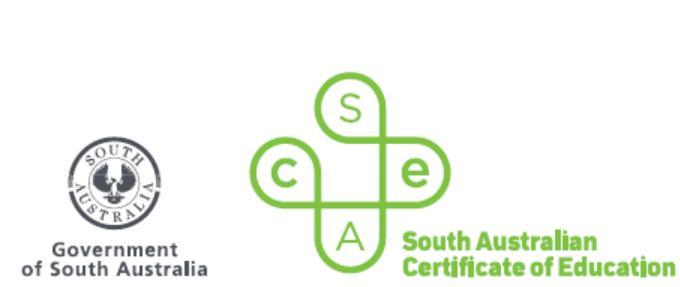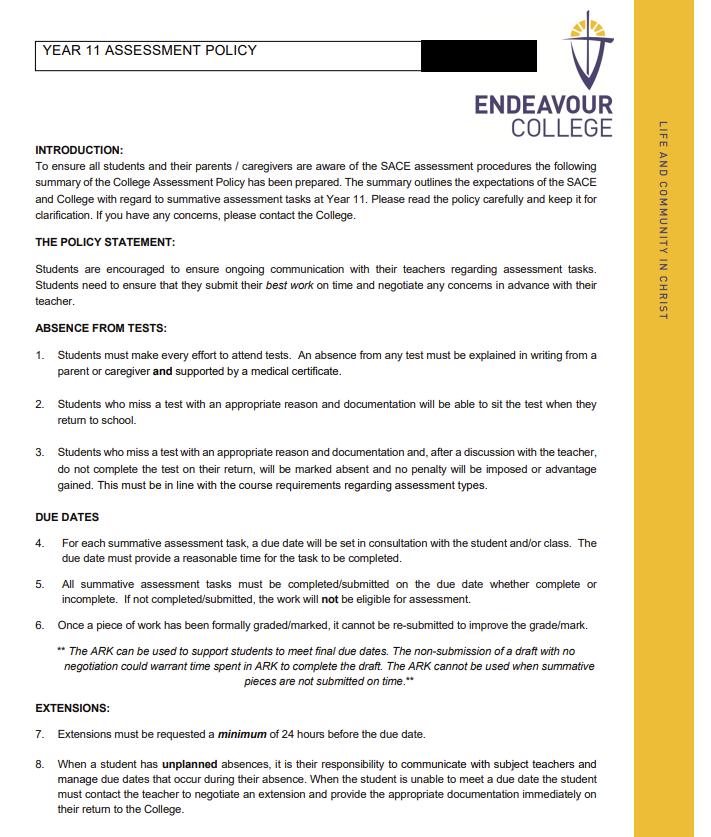




Year 11
• Care Group Teachers (Pastoral)and subject teacher/s (academic)

• Heads of Village (Course Counsellors)
• Head of Senior School - Michael Vickery
• Director of Learning - Sandra Barry
• Counsellors (The Well) - Marni Harding & Henry Lee
• Adaptive Education (The Hub) - Carol Thomas
• Student Pathways Leader - Deb Frahn
• SACE Coordinator - Lauren Gray


Sandra Barry Director of Learning
Lauren Gray Head of Litchfield Village
SACE Coordinator


• The South Australian Certificate of Education.
• A qualification awarded to students who successfully complete their senior secondary education.
• Internationally recognised.
• Leads to work, training and further study.


• Year 11- All SACE subjects.
• Vocational Education and Training (VET) Courses.
• Other vocational courses.
• Recognition of Community Learning credits.
Students must successfully complete compulsory subjects:

Stage 1:
• PLP (being replaced by Exploring Identities and Futures- EIF) (10 credits) – Year 10
• Literacy (at least 20 credits in an English course)
• Numeracy (at least 10 credits in a Mathematics course)
Stage 2:
• Activating Identities and Futures (AIF) (replacing Research Project)
Must attain minimum C Grades in PLP, English, Mathematics and AIF.
• Qualification stating you have completed secondary schooling.
• Lists grades achieved.
• Lists alternative forms of learning.

• Students who study 4 Stage 2 subjects qualify for an ATAR/University Aggregate.
• Grades achieved in the SACE are used to calculate a University Aggregate.
• The aggregate is then made into a rank order – ATAR.
• This is one way students can gain entry into university courses.

• Stage 2 subject
• Extended study in an area of interest.
• Completed in either Semester 1 or Semester 2.
• 10 Stage 2 credits towards their ATAR.
• Replaces the Research project and in similar but different.
• Students must achieve a C- or better.

The statement outlines
• Due Dates: Set by the teacher and should be adhered to at all times.
• Extensions: Preorganised and by individual request.
• Plagiarism: Dealt with severely. Student work is checked by TurnItIn.
• Absences: Medical certificate required when summative tasks missed.
Zero and Plagiarism Letters and Progress Letters
o On all subject Canvas Pages
o On all Village Canvas Pages



• At Stage 1 students receive A - E grades.
• Assessed via subject specific performance standards
• Stage 1 marked by teachers but also moderated in English, Mathematics and PLP.
• Use Canvas to see progress.

• At Stage 2 – English Literary Studies, History, Psychology, Geography, German, Biology and Japanese
• Stage 1 teachers of these subjects aim to provide students with opportunities to practice the electronic format for tests in Year 11.
• academic grade of `C' or higher.
• attitude notation of between 1 and 3.

• 80% attendance.

Work ceases to be your own or is unethical when
• summarise your ideas.
• find sources of information.
• ask for prompts and ideas.
• summarise sources or reduce the reading level.
• check grammar and spelling.
• the ideas presented are not your own.
• there has been too much reliance on wording changes such that the words impact the overall meaning, or it changes how you would write.
• AI has been used to re-write passages
• AI has been used to create a piece of work in its entirety.
• sources cited do not exist.

Some of the features that parents/caregivers have access to via the Parent Portal include:
• Timetable and Calendars
• Attendance records.
• The ability to see and update medical information.
• The ability to see and update personal contact information.
• End of Semester Reports.
We use of the TASS Events Function for giving permission for your child to attend events and excursions.


More information about how to access this in TASS Parent Lounge will be provided to you when an excursion including your child is scheduled.

• Careers Expo and 2026 Course Information Sessions in Week 4 of Term 3 (12 August)
• Students and parents will be invited to attend VET counselling sessions
• VETRO evidence for subsidised VET courses will need to be provided by no later than Week 8, Term 3.
• All school VET forms, and Registered Training Organisation (RTO) enrolment forms will need to be returned by Week 10, Term 3 to the Pathways Coordinator.

Popular VET courses fill quickly and so early notification of intent to undertake and return of forms is essential

Careers Expo and 2026 Course Information Sessions (Term 3
Week 4 (12 August)



Year 11

• Safe use of Alcohol (Paul Dillon) Year 10, 11, 12
• P.A.R.T.Y Impact of Risk-taking Program Year 11
• Road Safety (MFS) Year 11
• Managing Examination Stress Year 10, 11 and 12

• More work done during lesson means less that needs to be done at home.
• Listen to what is needed in an assignment/test.
• Record due dates in diary/calendar/Canvas.
• Ask questions for clarity and understanding. Ask during the lesson or organise time outside of class.
• Be aware that many of your subjects will have more theory compared with previous years.
• Build quality relationships within the classroom.
• Vital to respect other students’ right to learn in every class and each teacher’s right to teach.

• Some future choices depend on results from this year. Including compulsory subjects for completion of SACE
– Compulsory 2 Semesters of English ( Stage 1)
– Compulsory 1 Semester of Mathematics (Stage 1)
– Research project (Stage 2)
– Christian Living (College expectation)

• Maintain a balance between school, work, sport, paid work and family time
• Recommend no more than 10 hours per week spent working in a part time job
• Plan weekly commitments carefully to allow time for each.
There is a team of people who can and will help.
• Care Group Teacher/Subject Teacher – the first point of call
• HoV and Head of Senior School – anything and everything! We will coordinate the team.
• Marni and Henry – counselling support.
• Mrs Thomas and the Hub staff – additional support with academic work.
• Mrs Frahn – careers and pathways advice and guidance.

If you have questions, are unsure or are struggling reach out to someone in the SY team. The sooner we are aware the quicker we can help

• Relationship.
• Support College procedures – uniform, punctuality to school, Assessment policy requirements.
• Support with organisation and time management.
• Encourage students to devote adequate time to study.
• Monitor part-time work hours – recommend no more than 10 hours per week.
• Communication with the College via email or phone.
• Learning Conversations Term 1 Week 11

• Care Group Connection Term 2 Week 2
• End of Semester Examinations (June)
• End of Semester Examinations (November)
• Move Up Day –Meet Year 12 Teachers and final Senior Years Service (December)
• Senior Years Course Information Evening (August)
• Course Counselling Week (August)
• Melbourne Camp (September)

• Week 10 Term 3.
• Cultural/educational experience.
• Students will engage in a variety of activities that are relevant to their interests, future pathways and specific subject choices.
• Further information regarding location and specific activities will be communicated with you throughout the year.

• Support with organisation and time management.
• Encourage students to devote adequate time to study.
• Support College procedures – uniform, punctuality to school, Assessment Policy requirements.
• Monitor part-time work hours – recommend no more than 10 hours per week.
• Communication with the College via email or phone.




Emily Becker and Luke Pegoli
o Current Year 12 students who navigated Year 11 Last Year.
o Both College Captains for 2025.
o Very different academic journeys.